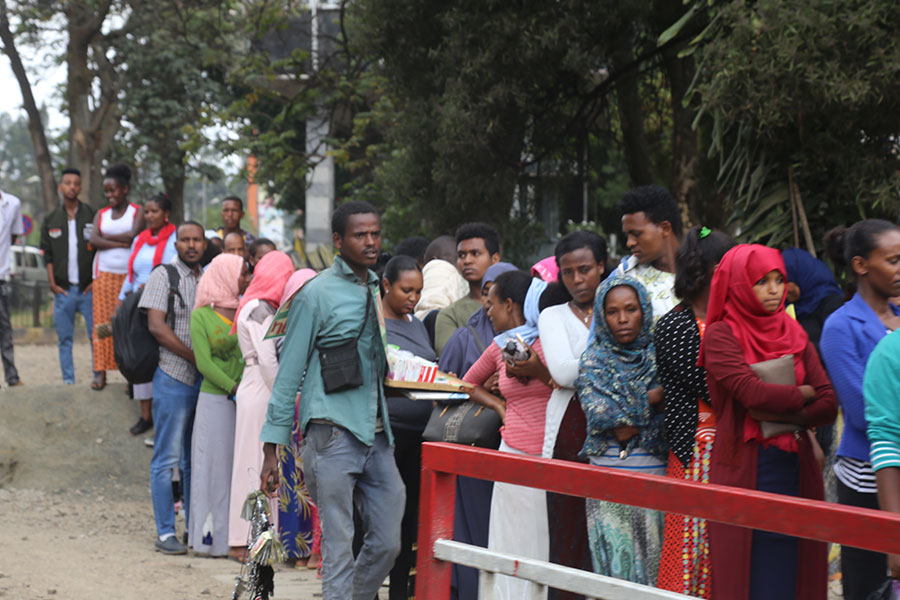
Radar | Dec 29,2018
Mar 30 , 2024
By Eskinder Abdi
A pressing issue frustrating the public has emerged in immigration policies and passport issuance services. The country's struggle with corruption, inefficiency, and insufficient infrastructure has led to delays and despair, marring the process for many and sometimes leading to applicants being taken advantage of.
The consequences of the flawed passport insurance system extend far beyond the inconvenience of long waiting times. For some, it means missed job opportunities, education, or urgent medical treatments abroad. Anecdotes abound of individuals who, caught in the system's inefficiency, find themselves at a crossroads, having to weigh the costs of waiting against the potential benefits of opportunities abroad. The situation underlines the urgent need for reform to ensure equitable access to travel documents.
Corruption, a pervasive barrier that skews the fairness of the passport issuance process, lies at the crux of the problem. Favouritism and bribery have become commonplace, creating a dual-track system where those with connections or financial means rig the process swiftly, leaving others languishing in uncertainty. The unfair advantage deepens the divide and undermines trust in public institutions.
The system's glaring inefficiency compounds the problem. Outdated infrastructure, a dearth of personnel, and a mire of bureaucratic procedures have extended waiting times, causing considerable and unbearable inconvenience for citizens. Limited access to application centres, especially in remote regions, exacerbates the situation, forcing many to undertake costly, time-consuming and long journeys. The lack of transparency in the passport issuance process adds another layer of uncertainty. Applicants often find themselves in the dark about their applications' status, with no information about the reasons for delays or rejections.
The ambiguity cultivates fertile ground for unfair benefit, with some individuals preying on applicants' desperation, promising expedited services for a fee, and, in some cases, engaging in outright fraud.
Immigration authorities should adopt a multi-pronged strategy. Tackling corruption head-on is paramount; establishing oversight bodies, regular audits, and stringent penalties for corrupt practices could be a bulwark against misconduct. Modernising the infrastructure of passport application centres and fully digitising the application process would go a long way in streamlining operations and cutting down wait times.
Building immigration officials' capacity through targeted training programs could enhance efficiency. Training in customer service, document verification, and fraud detection would equip them to manage the growing demand for passport services better. Improving accessibility by expanding the network of application centres and deploying mobile registration units would ensure broader reach, addressing the logistical limitations citizens face in remote areas.
Promoting transparency and accountability is another critical piece of the puzzle. Establishing clear and transparent procedures as well as updating applicants on their application status, would rebuild trust in the system. A tracking mechanism for online applications could offer real-time insights, further enhancing transparency. Public awareness campaigns play a vital role in empowering citizens.
Educating the populace about the passport application process, their rights, and the risk of engaging in corrupt practices would encourage them to demand better services and hold authorities accountable. Regional cooperation could provide a strategic advantage in combating fraud and illegal immigration while facilitating legitimate travel and trade. By harmonising immigration procedures and sharing information on human trafficking, the authorities can enhance security and facilitate smoother movement across borders.
The path to reforming Ethiopia's immigration and passport issuance processes is convolutedly tricky, requiring a concerted effort from the authorities, the public, and international partners. However, the authorities can only surmount these problems with political will and strategic investments. A more efficient, transparent, and fair system is within reach, promising a future where access to travel documents is no longer a privilege for the few but a right for all citizens. Overhauling the system benefits individuals looking to travel and bolsters Ethiopia's global standing, reflecting a commitment to governance, transparency, and respect for citizens' rights.
PUBLISHED ON
Mar 30,2024 [ VOL
24 , NO
1248]


Commentaries | Jul 18,2021

Agenda | Dec 10,2018

Editorial | Sep 27,2025

Agenda | May 04,2019

Commentaries | Jun 25,2022

Photo Gallery | 175614 Views | May 06,2019

Photo Gallery | 165834 Views | Apr 26,2019

Photo Gallery | 156206 Views | Oct 06,2021

My Opinion | 136834 Views | Aug 14,2021

Dec 22 , 2024 . By TIZITA SHEWAFERAW
Charged with transforming colossal state-owned enterprises into modern and competitiv...

Aug 18 , 2024 . By AKSAH ITALO
Although predictable Yonas Zerihun's job in the ride-hailing service is not immune to...

Jul 28 , 2024 . By TIZITA SHEWAFERAW
Unhabitual, perhaps too many, Samuel Gebreyohannes, 38, used to occasionally enjoy a couple of beers at breakfast. However, he recently swit...

Jul 13 , 2024 . By AKSAH ITALO
Investors who rely on tractors, trucks, and field vehicles for commuting, transporting commodities, and f...

Oct 18 , 2025
The political establishment, notably the ruling party and its top brass, has become p...

Oct 11 , 2025
Ladislas Farago, a roving Associated Press (AP) correspondent, arrived in Ethiopia in...

Oct 4 , 2025
Eyob Tekalegn (PhD) had been in the Governor's chair for only weeks when, on Septembe...

Sep 27 , 2025
Four years into an experiment with “shock therapy” in education, the national moo...

Oct 18 , 2025 . By NAHOM AYELE
In a sweeping reform that upends nearly a decade of uniform health insurance contribu...

A bill that could transform the nutritional state sits in a limbo, even as the countr...

Oct 18 , 2025 . By SURAFEL MULUGETA
A long-planned directive to curb carbon emissions from fossil-fuel-powered vehicles h...

Oct 18 , 2025 . By BEZAWIT HULUAGER
Transaction advisors working with companies that hold over a quarter of a billion Bir...